Latest News Archive
Please select Category, Year, and then Month to display items
01 July 2021
|
Story Dikgapane Makhetha
|
Photo Supplied

This year, the young people of South Africa celebrated 45 years of the annual commemoration of
Youth Day. The University of the Free State (UFS)
Community Engagement (CE) office on the
Qwaqwa Campus has engaged a number of stakeholders in the call to use football as a means of bringing people together, transforming lives, and enthusing communities. Through partnerships, community organisations have great potential to create opportunities for breaking down barriers and inspiring social cohesion, initiating enablement through the development of social projects, and promoting education and health awareness.
On 16 June this year, local community organisations collaborated in the hosting of a soccer event for the youth of Qwaqwa at the FIFA Football for Hope Stadium in Tsheseng.
The Agape Foundation for Community Development,
Love Life,
Right to Care,
Youth in Action, Qwaqwa FIFA Project, and the Tsheseng Athletics Club were all stakeholders who diligently joined forces to ensure the successful launch of the tournament. Community development practitioners, who are trainees in the UFS Qwaqwa Department of Community Development, were garbed in departmental branded gear and have cautiously facilitated adherence to COVID-19 protocols. About 250 people, including football fans and participants, attended and enjoyed the entertaining games. Through the partnered recreational project, the Qwaqwa Campus CE office responded to the 2021 Youth Day theme: ‘Growing Youth Employment for an inclusive and transformed society’, by enhancing opportunities for networking among stakeholders. Football is popularly known for promoting transformational social projects in diverse communities across the globe.
Monkey research attracts international attention
2016-07-11

Prof Trudy Turner from the University of
Wisconsin-Milwaukee and Prof Paul Grobler
from the Department of Genetics at the
University of the Free State, together with one
of the students researching monkey genes.
Photo: Siobhan Canavan
For this year’s Summer School programme, Prof Paul Grobler, from the University of the Free State Department of Genetics focuses on research about the conflict between monkeys and humans in areas where monkeys are regarded as problem animals.
Global expert part of research
This year, Prof Grobler is hosting a group of students and lecturers from the United States of America (USA). The group includes Prof Trudy Turner from the University of Wisconsin-Milwaukee (UWM), a global expert on vervet monkeys. She has been working with the Department of Genetics at the UFS for the past fifteen years, and has also been appointed as an Affiliated Professor in the department.
“The Summer School programme is an opportunity for the American Primatology students to gain practical experience in Africa,” says Prof Grobler.
International interest in Summer School
This year’s Summer School programme involves four lecturers and nine students. The lecturers are from the University of Wisconsin-Milwaukee (UWM), the University of California, Los Angeles (UCLA), Boston University, and Central Washington University.
“We use the genetic information to determine
how monkeys historically infiltrated the
different areas in South Africa.”
This year’s focus is on the genetic structure of the monkeys in South Africa, and research that is being done on the differences and similarities in monkeys from different areas. “We use the genetic information to determine how monkeys historically infiltrated the different areas in South Africa,” says Prof Grobler.
Local nature reserve acting as host
The group will perform field work, including observing monkeys in the Soetdoring Nature Reserve, as well as laboratory work in the department, where they will be assisted by two laboratory technicians.
Two years ago, Prof Grobler and his department tested this idea on a smaller scale, and now they hope to make this a regular event.